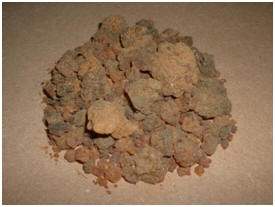Myrrh
Uses & Interesting Facts
Medicinal Uses
Myrrh is effective for mild inflammatory conditions of the mouth, gums, and throat as well as other mouth problems like bleeding gums, canker sores, gingivitis, and bad breath. The reason for it's effectiveness is that fact that it works to disinfect and deodorize.
Myrrh tincture can be made by mixing 1 part Myrrh with 5 parts 90% ethanol. This tincture is to be dabbed onto the infected area 2 to 3 times per day, or 30 to 60 drops can be added to a glass of water and rinsed or gargled.
Other than the tincture, Myrrh can also come as a powdered drug or an essential oil.
Side Effects
According to health-care-tips.org, pregnant women are not recommended to take any forms of Myrrh, as it has been proven to be a uterine stimulant, which tightens the muscles of the uteris, which could lead to a miscarriage. Other side effects of Myrrh given at health-care-tips.org include diarrhea, heart rate changes, and kidney irritation. Many other medical facts about Myrrh are given on the previously linked website.
Interesting Facts
 You
may be thinking to yourself, how is the resin collected from the
ducts of the Commiphora to produce Myrrh?
The Amateur's Digest: Commiphora humbertii explains
this process, along with many other facts about the
Commiphora species quite well. Since the resin ducts are
circular and can be found all over the bark of the tree, a thin
band (the incision is usually about .75 cm. deep) is formed
around the base of the tree and the resin soon begins to ooze
out of the tree. This process usually takes place begin ning in
November and continuing through January.
You
may be thinking to yourself, how is the resin collected from the
ducts of the Commiphora to produce Myrrh?
The Amateur's Digest: Commiphora humbertii explains
this process, along with many other facts about the
Commiphora species quite well. Since the resin ducts are
circular and can be found all over the bark of the tree, a thin
band (the incision is usually about .75 cm. deep) is formed
around the base of the tree and the resin soon begins to ooze
out of the tree. This process usually takes place begin ning in
November and continuing through January.
In addition to its medicinal uses, Myrrh is known to be formed into soaps. These soaps are commonly sold with soaps made from Frankincense and goats' milk. To learn more about the source of this goats' milk, check out the domestic goat webpage: Capra hircus. These soaps can be purchased at herbalremedies.com.